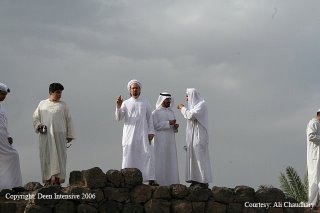Mercy and Justice
This morning after fajr we visited the house of Sukayna bint Husayn, the grand-daughter of Ali ibn Abi Talib, may God be pleased with them all. After her father was killed at Karbala, she was unjustly ostracized from the Muslim community and compelled to move outside of Madinah to a place where there was no water. To keep from dying of thirst, she dug a well with her own hands. Today, the house stands ruined within the city limits of Madinah.
 Among other places, we visited the ruins of the fortress of Ka`b ibn Ashraf, a wealthy and powerful Jewish chieftain who committed treason when he violated the alliance treaty of Madinah that he had agreed to with the Prophet, peace be upon him. For his treason, the Prophet peace be upon him is reported to have exacted retribution from him and his tribe on behalf of the Muslim community that had been betrayed and whose lives and property had been imperiled by his actions.
Among other places, we visited the ruins of the fortress of Ka`b ibn Ashraf, a wealthy and powerful Jewish chieftain who committed treason when he violated the alliance treaty of Madinah that he had agreed to with the Prophet, peace be upon him. For his treason, the Prophet peace be upon him is reported to have exacted retribution from him and his tribe on behalf of the Muslim community that had been betrayed and whose lives and property had been imperiled by his actions.An important point to note about this historical event is that when the Prophet peace be upon him was in Makkah, he always forgave any harm others inflicted upon him. When he assumed state authority in Madinah, he had to implement justice to redress the wrongs suffered by his community of which he was now the representative. What was common to both Jewish and Islamic law at that time was the principle of proportionality. Since that Jewish tribe of Madinah engaged in treason and betrayal of the other inhabitants of Madinah, the men of that tribe were given capital punishment in accordance with the legal custom of the time. (Note that capital punishment is also the prescribed penalty for treason in modern America). In the prophetic tradition, all actions can be characterized by their correspondence with justice or with mercy. It may be said that Makkah was an arena for the manifestation of the prophetic mercy and Madinah was an arena for the manifestation of prophetic justice. In this way was the Prophet Muhammad, peace be upon him considered the messenger of the middle way.
In contrast to the story of Ka`b ibn Ashraf, there is the story of Muhayriq, a learned and pious Jewish man who was the only man of his people in Madinah to honour the pact that required all of its inhabitants to bear arms in order to repell any attackers of the city and its inhabitants. When the Prophet, peace be upon him saw Muhayriq striding forward onto the battlefield to honour the pact in his armour, with his shield ready and sword drawn, he said: huwa khayrul-Yahud ("He is the best of the Jews"). Muhayriq was killed in battle and his property was established as a charitable endowment (waqf) for the benefit of all the citizens of Madinah. When we visited this place, it was lush with vegetation and we were told the well water there was blessed and that many believed it to have healing properties. We drank from it and prayed for God to heal our bodies and our spirits with it.
*Partially adapted from the notes of Firdous Lopez (California, USA)
 Shaykh Yahya Rhodus also continued his lectures from Imam al-Ghazali’s famous work Ayyuhal-Walad translated as “Dear Beloved Son.” Some points paraphrased from that lecture are as follows:
Shaykh Yahya Rhodus also continued his lectures from Imam al-Ghazali’s famous work Ayyuhal-Walad translated as “Dear Beloved Son.” Some points paraphrased from that lecture are as follows:Even if you have excellent medicine, without treatment, no recovery can be achieved.
Remember often the Ender of Pleasures (i.e. death).
Take yourself to account before you are taken to account. Weigh your acts before they are weighed.
From the poets:
Though you measure 1000 bottles of wine
Unless you drink no thrill is thine
Be a walking Qur’an.

0 Comments:
Post a Comment
<< Home